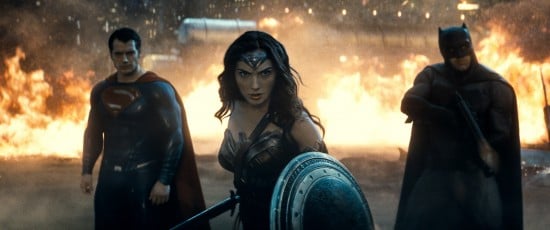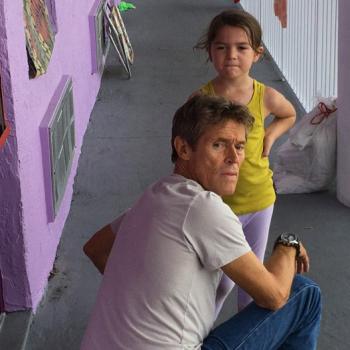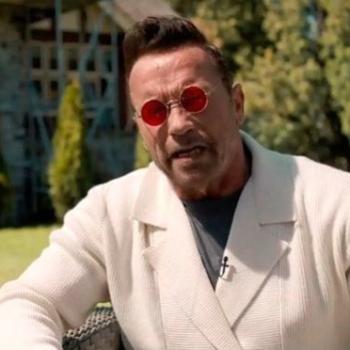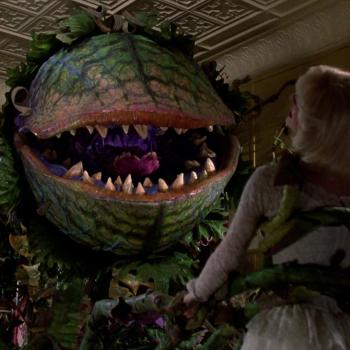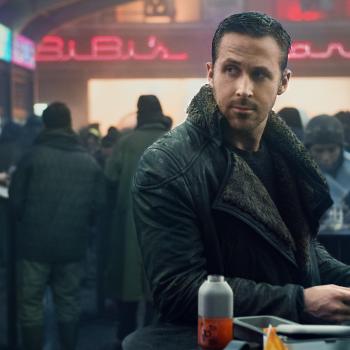Every once in awhile, I’ll walk in on my 4-year-old son playing with his superhero action figures. He’s taken a particular shine to Batman and Superman and will often pit the two against each other. When I ask why they’re fighting instead of working together, he sometimes responds that one of them’s a bad guy.
“No buddy,” I’ll remind him. “They’re both good guys. They’re the heroes; they help people.”
But maybe Mickey’s just caught on to the zeitgeist. In “Batman v Superman: Dawn of Justice,” the two caped warriors are definitely not friends, and their actions are less than heroic. If Mr. Rogers advised us to look for the helpers in times of trouble, “Batman v Superman” tells us they’re actually not much of a help.
A joyless, cacophonous slog, Zack Snyder’s follow-up to 2013’s “Man of Steel” pits a sadistic Batman against a mopey Superman. In the end, we lose. It’s dour, angry and contemptuous of its audience. It’s also terrible, the type of loud, angry and dumb superhero movie that shouldn’t exist post-“Iron Man” and “The Dark Knight.”
I once joked that “Man of Steel’s” orgy of destruction would still be going by the time we returned to Metropolis, and I wasn’t wrong. “Batman v Superman” opens by replaying the film’s building-shattering climax, only this time we see it from the perspective of Bruce Wayne (Ben Affleck), who watches several of his employees perish when Superman and Zod destroy one of his buildings. It’s a clever idea, responding to the major criticisms of that film, and giving Bruce/Batman a reason to be suspect of the ultra-powerful alien. Unfortunately, Snyder loses that focus amid the mess of subplots, set-ups and smack downs that follow.
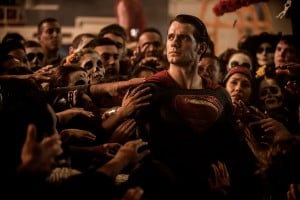
Metropolis actually seems okay with the fact that Superman wiped out half its population in his fight with Zod. The Daily Planet writes editorial pieces lauding the caped hero, and the city has erected a statue in his honor. There are a few dissenters, such as a Wayne Enterprises employee who was harmed in the fight. But by and large, Metropolis likes Superman. But that doesn’t mean he’s been welcomed to the world with open arms; a senator (Holly Hunter) is investigating an incident involving the Man of Steel in the Middle East, and opportunistic tech mogul Lex Luthor (Jesse Eisenberg) has discovered a mysterious green rock that can degrade Kryptonian cells. Superman, meanwhile, is in a constant state of angst about whether to help a humanity who might not want him, thinking maybe he should just spend his time canoodling in a bathtub with Lois Lane (Amy Adams). As Clark Kent, he’s also failing at his job, more interested in the Bat vigilante across the harbor in Gotham City than in the football games his editor (Laurence Fishburne) assigns him.
There is, of course, precedent for Batman and Superman throwing down. Both characters have differing ideologies and opposing worldviews, and there are ways to tell a story that could use those differences to incite a clash. The seeds are present in this movie. Batman’s cynicism makes him suspect of a being with near-limitless power. And Superman, ever the boy scout, doesn’t care for Batman’s brutal vigilante tactics, which have escalated to include branding, and sometimes paralyzing, his victims. A film that spent more time dwelling on these differences, letting them simmer before exploding into conflict, could work.
Instead, Chris Terrio and David Goyer’s bloated script tries to serve as Batman reboot, Superman sequel and DC Universe set up. Subplots clash messily and the film is a mishmash of scenes that don’t flow so much as slam into each other. Rather than simply allow Batman and Superman to come to blows on their own, Snyder and his screenwriters feel the need to shoehorn in government conspiracies, genetic meddling, mommy issues, and theological and political pontificating that’s not half as clever as it imagines (and it probably doesn’t imagine itself to be that clever in the first place). Its attempts to shoehorn in cameos by future Justice League heroes is so shoddy and clumsy that it makes the convoluted “Iron Man 2” look smooth; there’s literally a moment where a character discovers the existence of other heroes via webisodes.
Strong actors are left flailing in the wind. Adams’ resourceful Lois Lane was one of the few highlights of “Man of Steel,” but here she’s largely useless, a damsel in distress. Fishburne shows up, says a few “funny” lines and collects a paycheck, and Diane Lane is too good to be left to flounder as Superman’s mom (who continues the family tradition of telling her son not to help people). Gal Gadot has a few fun moments as Wonder Woman, and is the only one who looks like she’s having fun in the film’s protracted final battle. But she’s given so little to do that she never makes an impact. And then there’s Eisenberg, twitching and mugging for the camera, telling bad jokes as if he wandered in from a Joel Schumacher version of this film. Which, admittedly, might have been more fun.
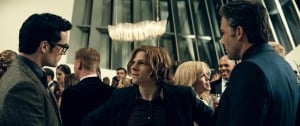
To be fair, Affleck is fantastic as hard-living playboy Bruce Wayne, who feels threatened and powerless, attending underground fight clubs and sleeping with random women. He has a fun rapport with a grizzled Jeremy Irons as Alfred, the two hinting at a shared, sad history. I’d easily watch a Batman film starring those two, although preferably directed by someone else. Unfortunately, Snyder insists on making Batman a raged-out angry bro, intimidated by Superman and ready to yell “come at me” if the Man of Steel so much as sneezes near him. Rather than have a haunted, possibly scarred Batman, Snyder turns him into a sadistic monster who seems to take pleasure in dishing out pain. This is a Batman who uses (a lot of) guns and who I’m pretty sure straight-out murders some of the bad guys.
Cavill, who could be an effective Superman with the right guidance, is stranded by a director who seems to actively hate the character. Superman helps people but never seems joyful about it. He’s a savior out of obligation, and spends most of the film moping about whether he really wants to be a good guy. I understand there are multiple interpretations of the character, but one of the constants is Superman’s affability. He likes people, talks to the press and makes corny jokes. This Superman sits gloomily outside Lois’ balcony because no one likes him. When he goes to address Congress — in costume, which is a very Superman thing to do — he never gets to give a speech; Snyder decides to stage an explosion, which leads to more angst.
A film that pits Batman versus Superman needs to balance the former’s darkness with the latter’s light. Instead, Superman’s just as gloomy and morose as Batman. Snyder is the wrong person to be telling this story. His style is that of an angry teenager who thinks violence and grimness count as maturity. Why else would a Superman movie feature a scene where a villain threatens to burn his mother alive? Instead of an exploration of two differing ideologies and the conflict that comes when they clash, the film turns into an angry, bombastic scream in its third act. Rather than let the seeds he planted organically move the plot along, the final fight literally happens because his two superheroes are manipulated by a petulant brat, and because Batman is too eager to smash than to listen to Superman’s pleas to team up.
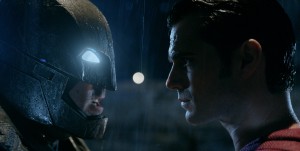
Whatever his narrative faults (and they are legion), Snyder has always been a skilled visual artist. But even here, he fails. The action sequences are chaotic, a mess of hand-held blurs and bad CGI. After waiting for two hours, we finally get the long-promised throwdown between the two heroes, and it’s about 10 minutes long. Snyder packs a lot of brutality and rubble into those 10 minutes, but it grows so over the top that it becomes a sort of brutal slapstick. By the time Batman ripped out a sink to bash Superman’s head in, I couldn’t help and started laughing. The two, of course, team up in the end for a battle against a Kryptonian monstrosity, but that unending skirmish is a horrendous jumble of noises, horrible effects and confusing action. The city, however, does largely get to remain standing.
“Batman v Superman” is loud, boring and inept. But its biggest crime might be the sour tone it strikes. Between this and the third-act imagery of “Man of Steel,” Snyder legitimately seems interested in a story about heroes in a world filled with calamity, disaster and terror. But his answer is not that heroes bring hope, stability and peace. It’s that they turn dark, angry and morose. His view of the world is one of never-ending conflict and anger. “If God is all powerful, he can’t be good” one character muses and, late in the film, Superman tells Lois, “No one remains good.” Those are interesting themes to explore, but they’re not starting points for Snyder; I think he really believes in that worldview. That’s his right, but maybe telling stories about characters children look up to is not the best way to express it.
I saw “Batman v Superman” the same day terror attacks occurred in Belgium and as America’s presidential race continued morphing into a toxic sludge. We’re in dire need of hope, brightness and reminders that there is good here. God can be powerful and good at the same time, and he doesn’t stoop to petulant whining when people reject him or things go bad. This is the world I’m raising my kids in. My son looks up to heroes; he believes in them. I wish he was getting the heroes he deserves.
Like me on Facebook!

